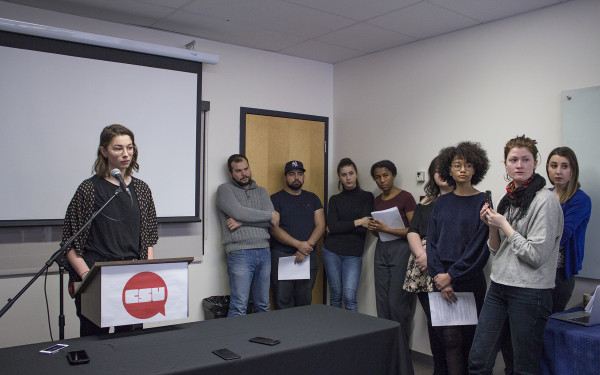Continuing The Fight Against Concordia’s Rape Culture
What You Need to Know About Campus Sexual Violence
This year Concordia’s administration faced one of its biggest public relations scandals in recent years.
As a result, press conferences were called, a task force was created, and the administration had a whole lot of damage control to do.
What happened last semester?
On Jan. 8 2018, students had been back in class for one day when a graduate of the university’s creative writing program published a blog post, “No Names, Only Monsters,” detailing a toxic climate within the program. In the post, writer Mike Spry described inappropriate relationships between professors and students, and references an essay by another former graduate, Emma Healey, which recounts her abusive relationship with a professor in the program.
Two days later, Concordia announced the creation of their Task Force on Sexual Misconduct and Sexual Violence, made up of members of the administration, students, staff, and faculty. They sent a callout for students who wished to apply. The Concordia Student Union promptly protested the callout on the grounds that it violated provincial legislation, which says only student associations can appoint students to councils or committees in the institution.
The task force was met with criticism by the CSU and the Concordia commiunty. On Feb. 1, the CSU demanded three changes to the task force: that the CSU select the undergraduate students for the task force, that the requirement that students be in good academic standing be dropped, and that the number of students on the task force is increased from two to four.
CSU General Coordinator Sophie Hough-Martin explained that the requirement that students be in good academic standing to be on the task force lowers the chance of survivor representation.
“Anyone who’s gone through any kind of trauma or emotional difficulty can tell you that your academics are absolutely impacted by what you experience in your everyday life, and especially when it comes to complaints against your professors,” she said.
Throughout the semester, more allegations of sexual misconduct came to light. The former president of the Graduate Student Association was accused of sexual harassment by two women, the outgoing president of the Arts and Science Federation of Associations resigned amid sexual harassment allegations, and a former student filed a complaint against the university with the Quebec Human Rights Commission due to the administration’s inaction when she reported a philosophy professor for sexual harassment.
In March, the sexual violence task force held public consultations with undergraduate students. Some students denounced the short notice for the consultations—two weeks—which led to a low turnout.
“A lot of [CSU] councillors were very upset, on behalf of undergraduate students, about the very short notice that was given for this particular session,” former CSU Arts and Science councillor Charlotte Genest told The Link at the time.
The findings of the third party investigation into the allegations are confidential. David McGimpsey and Jon Paul Fiorentino, the professors at the heart of the investigation as the CBC determined, are no longer listed as professors in the department.
On June 26, the task force released their study findings. The study found that among other issues, students are generally unaware of services available to them when dealing with sexual violence.
“Anyone who’s gone through any kind of trauma or emotional difficulty can tell you that your academics are absolutely impacted by what you experience in your everyday life.” —Sophie Hough-Martin
What services are available in response to campus sexual violence?
Students can book appointments with psychiatrists and other doctors in Concordia’s Health Services, after having seen a nurse during drop-in hours. While insurance, such as Quebec’s Medicare system, is not required to see a nurse, it is to see a specialist.
Health Services is on the GM Building’s second floor. There is usually a wait time to see a specialist, which varies throughout the year.
Another resource is the Sexual Assault Resource Centre, located on the sixth floor of the Hall Building. SARC coordinator Jennifer Drummond explained that they offer a variety of services to survivors and their allies: one-on-one support, group activities, peer support with volunteers, and an advocate to accompany a survivor to the police, the hospital, or to court.
“We offer a lot of different services to those who have experienced sexual violence, but also to their friends, family members, allies, people who are supporting them, people in our community that have received a disclosure,” said Drummond. “I often will speak with a faculty or staff [member] who’ve had a student disclose to them and they’re wanting to make sure they’re being supportive or have offered the right resources.”
When students are in need of academic accommodations because their trauma has affected their performance, they can also come to the SARC to begin that process.
Drummond explained that the SARC has seen a few spikes in the demand for services throughout the year, especially at the beginning of the year, after the holidays, or in the weeks leading up to exams, which can increase wait times to access certain services.
If that is the case, the Centre for Gender Advocacy is another place to find help. The centre offers peer support with volunteers available to listen and talk through trauma. Usually, someone is available to sit with students the same day they seek help.
The centre’s new office is at 2100 Guy St., in suite 205.
How do you file a report with the university about a student or staff member?
If students wish to file an official complaint with the university, they can do so at the Office of Rights and Responsibilities. Reports are accepted within 90 days of the incident.
In their consultations, the Task Force on Sexual Misconduct and Sexual Violence found that 70 per cent of those who reported to the university were disappointed with the result.
“There’s a lot of documentation that goes along with it that can be hard to navigate and read,” explained Hough-Martin. “The sexual violence policy leads you to the code [of rights and responsibilities], the code leads you to the office, and the office leads you somewhere else.”
For this reason, Hough-Martin suggests accessing an advocacy resource to have a volunteer who is familiar with the process and the documentation walk you through it. An advocate is available from the SARC, the CSU Advocacy Centre or even from the university itself.
Otherwise, students can visit the Office of Rights and Responsibilities to begin the process of filing a report, located in the GM Building, room 1005.




_600_375_90_s_c1.jpg)
_600_375_90_s_c1.jpg)

